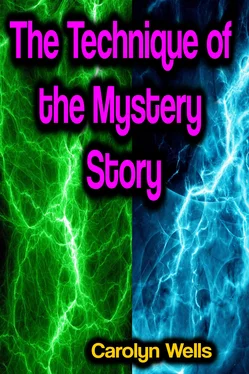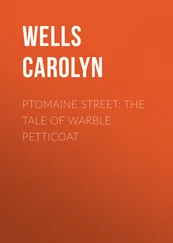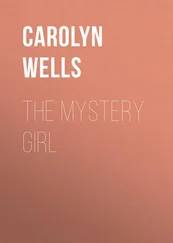1 ...6 7 8 10 11 12 ...16 The Riddle Story, then, is based entirely on a puzzle whose solution is a clever trick of the author and usually not to be guessed by the reader. Unlike the Detective Story, there are no clues, either true or misleading. The reader goes swiftly from his first surprise to sustained wonder, and then to an intense and abiding curiosity that lasts until the solution is flashed upon him. The plot is meant to catch the reader napping, and seldom indeed is he wide awake enough to solve the riddle.
A distinct type of Riddle Story is that which describes a search for lost treasure. In so far as the searchers encounter mysterious conditions, or the reader is held in suspense concerning the meaning or outcome of the situations, in so far is the tale a Riddle Story. But to be a real Riddle Story, the mystery must be carefully built up, sustained and finally revealed with careful and coherent sequences.
Poe's story, "The Oblong Box," is one of the greatest Riddle Stories ever written. The mystery is seemingly inexplicable. The interest is intense and the conditions partake of all the elements of ghastliness and horror. The solution is unguessable but entirely logical, and Poe's inimitable workmanship makes the story a masterpiece of its kind.
Equally clever, in a totally different vein, is Kipling's "His Wedded Wife," and, different still, Aldrich's "Marjory Daw."
In both of these, the surprise is perfect, and so inherent a part of the plot, so skillfully and swiftly worked up, that all demands of the true Riddle Story are complied with.
In some Riddle Stories the interest is not in the unraveling of the web, but in the weaving of it. In De Quincey's "The Avenger" this is the case, and also in Bulwer's "A Strange Story." It is the strangeness of the story that captivates in these instances. The maze of mystery and hazard, and the confidence that it will all be made plain to us at last, provide sufficient charm to the lover of the Riddle Story. Crime and its detection have no part here, but mystery and paradox reign supreme.
Another sort of Riddle Story employs the cypher or cryptogram plot, but this is of such importance as to require a chapter to itself.
Poe's "Gold Bug" includes both the cryptogram and the buried treasure, and is of course the greatest story built upon either or both of these plots.
A novel by James DeMille is called "The Cryptogram," and the cypher is the main point of the story. But more often, cypher or secret writing is used as a side issue or a picturesque device in a stronger mystery plot.
Chapter
6
What Is a Detective Story
Rise of the Detective Story
The Detective—Fictive and Real
Fiction versus Fact
The Interest of the Detective Story
A Summing Up
1. What is a Detective Story
The class of fiction which we shall group under this head must include all stories where the problem is invented and solved by the author and set forth in such a way as to give an astute reader opportunities for guessing or reasoning out the answer.
An actual detective need not necessarily figure in the story, but detective work must be done by some of the characters.
There must be crime or apparent crime or attempted crime. But whether the problem is one of murder, robbery or kidnapping,—whether it be solved by evidence, deduction or a cryptogram,—it is detected, not guessed, and this is the main element in our classification.
The average or typical Detective Story of to-day is the detailed narrative of the proceedings of an individual of unusual mental acumen in unraveling a mystery.
Strictly speaking, a detective is a member of the police organization or of a private detective agency. But for fictional purposes he may be such, or he may be any one with what is called "detective instinct" or a taste for detective work.
It appears that in its earliest days the word "detective" meant merely a shadower or follower.
A curious old story in Harper's Magazine for 1870 begins thus:
The remarkable skill and penetration shown by our modern detectives in "shadowing" suspected persons until sufficient proof has been obtained to warrant their arrest is illustrated by the daily history of crime. By the term "shadowing" is meant that vigilant watch kept upon the culprit by some one who follows him like his own shadow, and to do this successfully indicates no small degree of skill on the part of the "detective." This last expression recalls to memory some strange facts which came to my knowledge in the early part of my life, and I can never meet the term in print or hear it in conversation without a painful reminiscence.
The story goes on to relate the harrowing experiences of a criminal who was shadowed by the ghost of his victim, and ends thus:
Such is the story in connection with the first use of the term "detective," and I never meet it, either in voice or in print, without thinking of Captain Walton, and the fearful retribution unfolded in his history.
But this old story is not a Detective Story according to our classification, it is a simple Ghost Story. It is only of interest in referring to the earliest use of our word "detective."
2. Rise of the Detective Story
The Detective Story as we know it was first written by Poe, yet he never used the descriptive word, nor was Dupin a detective, either professional or amateur, for when Poe wrote his immortal Dupin tales, the name "Detective" Stories had not been invented; the detective of fiction not having been as yet discovered. And the title is still something of a misnomer, for many narratives involving a puzzle of some sort, though belonging to the category which we shall discuss, are handled by the writer without expert detective aid. Sometimes the puzzle solves itself through operation of circumstance; sometimes somebody who professes no special detective skill happens upon the secret of its mystery; once in a while some venturesome genius has the courage to leave his enigma unexplained. But ever since Gaboriau created his Lecoq, the transcendent detective has been in favor; and Conan Doyle's famous gentleman analyst has given him a fresh lease of life, and reanimated the stage by reverting to the method of Poe. Sherlock Holmes is Dupin redivivus , and mutatus mutandis ; personally he is a more stirring and engaging companion, but so far as kinship to probabilities or even possibilities is concerned, perhaps the older version of him is the more presentable. But in this age of marvels we seem less difficult to suit in this respect than our forefathers were.
The fact is, meanwhile, that, in the Riddle Story, the detective was an afterthought, or, more accurately, a deus ex machina to make the story go. The riddle had to be unriddled; and who could do it so naturally and readily as a detective? The detective, as Poe saw him, was a means to this end; and it was only afterwards that writers perceived his availability as a character. Lecoq accordingly becomes a figure in fiction, and Sherlock, while he was yet a novelty, was nearly as attractive as the complications in which he involved himself.
Detective Story writers in general, however, encounter the obvious embarrassment that their detective is obliged to lavish so much attention on the professional services which the exigencies of the tale demand of him, that he has very little leisure to attend to his own personal equation—the rather since the attitude of peering into a millstone is not, of itself, conducive to elucidations of oneself; the professional endowment obscures all the others. We ordinarily find, therefore, our author dismissing the individuality of his detective with a few strong black-chalk outlines, and devoting his main labor upon what he feels the reader will chiefly occupy his own ingenuity with,—namely, the elaboration of the riddle itself. Reader and writer sit down to a game, as it were, with the odds, of course, altogether on the latter's side,—apart from the fact that a writer sometimes permits himself a little cheating. It more often happens that the detective appears to be in the writer's pay, and aids the deception by leading the reader off on false scents. Be that as it may, the professional sleuth is in nine cases out of ten a dummy by malice prepense; and it might be plausibly argued that, in the interest of pure art, that is what he ought to be. But genius always finds a way that is better than the rules, and it will be found that the very best riddle stories contrive to drive character and riddle side by side, and to make each somehow enhance the effect of the other.
Читать дальше












